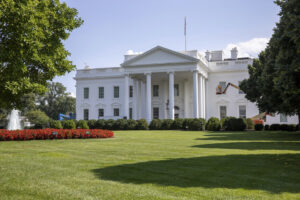
The National Interest Foundation Newsletter
Issue 227, March 8, 2024
Welcome to our NIF Newsletter. This week, we look into how Republican anti-Muslim bigotry from some lawmakers is blocking a Muslim judicial nominee, investigate the American Israel Public Affairs Committee’s (AIPAC) 2024 dark money campaign reaching astronomical levels at $100 million targeting progressive Members of Congress and candidates who have criticized Israel’s destructive War on Gaza, and analyze whether or not U.S. humanitarian airdrops have been sufficient in providing much-needed aid to civilians in Gaza.
Republican Anti-Muslim Bigotry is Blocking a Muslim Judicial Nominee

The White House has affirmed that it fully stands behind Mangi and is calling on the U.S. Senate to confirm him. (Photo from Politico)
Republican Anti-Muslim Bigotry is Blocking a Muslim Judicial Nominee
Back in January, the U.S. Senate Judiciary Committee had advanced lawyer Adeel Mangi’s potential historic nomination. The Biden administration nominated Mangi to serve on the U.S. Court of Appeals for the Third Circuit, where he would become the first Muslim-American federal appellate judge if he is confirmed. This week, the White House, alongside several allied law enforcement and labor groups, emphasized its support for the judicial nominee who has faced Islamophobic attacks from some Republican lawmakers in the Senate Judiciary Committee. The Republican chairs in the Senate Judiciary Committee bombarded Mangi with irrelevant and combative questions related to the 9/11 terrorist attacks, the Israel-Hamas War, the October 7th Hamas attacks, and policy issues related to the illegal Israeli occupation of Palestine. Mangi was even asked if he celebrated the 9/11 terrorist attacks.
The questions posed to Mangi were insinuating that he would be supportive of acts of terror due to his religious faith. Mangi was forced to repeatedly condemn antisemitism and terrorism, despite being asked similar questions already. The Republican lawmakers’ line of questioning was Islamophobic in nature, and was denounced by many entities including the Biden administration, CAIR, and AFL-CIO. Additionally, an array of prominent Jewish organizations such as the American Jewish Committee, the National Council for Jewish Women, the Anti-Defamation League, and others had previously voiced their support for Mangi’s nomination as well. The groups have highlighted that nominees should be evaluated based on their intellectual and legal abilities, and not based on their religious beliefs. White House Deputy Press Secretary Andrew Bates remarked that “the White House stands 100 percent behind Mr. Mangi” and urged the U.S. Senate to “swiftly confirm him.”
Mangi is a highly-qualified candidate for the position, known for protecting religious rights in the private sector as a partner at the Patterson Belknap Webb & Tyler LLP law firm. He also served as an advisory board member at Rutgers University’s Center for Security, Race, and Rights for four years. The Senate Judiciary Republicans had also accused the Rutgers Center of platforming terrorist sympathizers, using Mangi’s affiliation as supposed justification for their questioning and opposition. Among the Republican Senators who subjected Mangi to harsh questioning were Tom Cotton, Ted Cruz, and Josh Hawley. Rights and civil liberties advocates lament the fact that these are individuals in positions of power who are making bigoted insinuations about groups of people whom they undoubtedly represent in their home states. These are supposed to be leaders who set a good example to the public, and hold sway over public opinion. Thus, it does not send a good message to the public when elected officials link being Muslim to supporting terrorist activities and being antisemitic, behavior that is blatantly Islamophobic and discriminatory. Coming to judicial nominee Mangi’s aid during the inflammatory questioning were Senators Dick Durbin and Corey Booker, who both rebuked the aforementioned Senate Judiciary Republicans, with Durbin stating that they have “reached a new low.”
As pointed out in an editorial board from a newspaper in Mangi’s home state of New Jersey, what should have been a historic and joyous moment for him turned into an “ugly spectacle.” Instead of asking about Mangi’s impressive qualifications or some of his landmark cases, the three Senate Judiciary Republicans relentlessly interrupted and peppered him with suggestive questions unrelated to his professional expertise or qualifications as a federal appellate judge nominee. One can only hope that an individual like Mangi – someone who has admirably dedicated his career to advocating for religious freedom and tolerance on behalf of those of all faiths – will ultimately be confirmed by the U.S. Senate in what would be poetic justice in the face of some of the bigotry that he himself was forced to endure during the process.
AIPAC’s 2024 Dark Money Campaign Reaches Astronomical Levels at $100 Million

Some of the notable elected officials being targeted by AIPAC include the progressive U.S. House Democrats known as “The Squad.” (Photo from AP)
AIPAC’s 2024 Dark Money Campaign Reaches Astronomical Levels at $100 Million
Campaign money has long been a reliable indicator when making predictions on who will win an election. Multiple factors lead to political victory, including a candidate’s policies, personality, and viewpoints. However, numerous studies have shown that candidates who spend the most money on their campaigns typically win their respective races. Campaign spending allows candidates to hire more staffers, run more ads, and generally get their name out to the public. Given the importance of money in politics, it is no surprise that running for office often necessitates raising money to attack and combat one’s electoral opponent, and this leads candidates to trying to find donors who will support them. One of the most powerful lobbying groups is the American Israel Public Affairs Committee (AIPAC), which has large donors who are willing to support pro-Israel candidates in both primaries and general elections, and at the same time attempt to smear ones that justifiably criticize the actions and policies of the Israeli government. Against the backdrop of Israel’s destructive War on Gaza, donors are particularly fervent and it was revealed that AIPAC spending is ramping up this year. This electoral cycle in 2024, AIPAC is expected to spend $100 million across its political entities, aiming its funds at current Members of Congress up for re-election and candidates seeking office who have been critical towards Israel. The United Democracy Project (UDP), a super PAC linked with AIPAC, is monitoring between 15 and 20 U.S. House races and polling in those respective districts – showing just how far-reaching they plan to go to influence electoral outcomes.
Previous AIPAC efforts to unseat Members of Congress unfavorable towards Israel have often worked. This was evident in their 2022 midterm attempts, where AIPAC saw their backed candidates win six out of the eight primary races where they intervened – a success rate of 75%. According to OpenSecrets, AIPAC had spent around $13.4 million in campaign contributions, and approximately $2.7 million in lobbying efforts in the form of individual donations from members. Their 2024 plan calls for $100 million in contributions, dwarfing the 2022 amount and aimed at increased levels of influence on electoral outcomes. Back in 2022, U.S. Representative Andy Levin (D-MI) was ousted from his seat after AIPAC spent $4 million against him. AIPAC had targeted several progressive Democrats in the last cycle over their criticism of Israeli policies and actions. Levin advised Dave Min – a California Democrat running for an open U.S. House seat who has been targeted by AIPAC for his alleged private comments about Israeli Prime Minister Benjamin Netanyahu – suggesting that Min reach out to progressive Jewish groups and organizations. However, Levin was not overly optimistic, stating that most candidates could not survive being swamped by outside spending, and he is “afraid that they can be quite successful in wiping them out.” J Street, a progressive advocacy group that defended candidates against AIPAC attacks in the 2022 primaries, said that it will focus its $10 million program on the general elections and not the primaries, due to its inability to match AIPAC dollar-for-dollar.
The War on Gaza has created divisions within the Democratic Party, and has led to invigorated fundraising by candidates with differing stances on the issue. U.S. Representative Rashida Tlaib (D-MI), a critic of Israel’s military offensive in Gaza, raised $3.7 million during the last 3 months of 2023. Meanwhile, UDP finished 2023 with around $41 million, nearly double the entire spending program for the 2022 midterm electoral cycle. AIPAC contributed to U.S. Representative Rich McCormick’s (R-GA) campaign, which proposed a resolution to censure Tlaib for allegedly using “anti-Semitic rhetoric while speaking out against U.S. aid to Israel” – a harmful and inaccurate tactic often deployed against those who criticize Israel which is aimed at dangerously trying to equate fair denunciation of Israel with bigoted anti-Semitism. AIPAC also contributed to the campaigns of eleven out of the twelve Republican co-sponsors of the censure resolution.
All that has transpired in Gaza since last October has mobilized many donors to contribute more towards AIPAC and other pro-Israel groups. AIPAC has, thus far, given at least $19 million to 2024 U.S. House and Senate campaigns, according to Politico analysis of campaign finance filings. Some of their funds have also gone towards running negative ads on deemed opponents, without mentioning their actual stance on Israel. AIPAC has reportedly spent over $4.6 million on smear ads and mailers against Min alone, mentioning nothing of Min’s position on Israel and instead bringing up a previous DUI arrest. As previous cycles show, AIPAC can serve as a negatively impactful group which puts elected officials and candidates seeking office who believe Israel’s actions have been morally and lawfully unjust at risk politically. Members of “The Squad,” a group of progressive U.S. House Democrats that have openly called for a ceasefire in Gaza, are among those who are being most prominently targeted by AIPAC. According to experts, U.S. Representatives Cori Bush (D-MO) and Jamaal Bowman (D-NY) are members of “The Squad” that are especially at risk due to their lower campaign funds compared to their opponents’ larger AIPAC-endorsed ones. AIPAC’s massive campaign contributions and attack tactics demonstrate the effect they can have on election outcomes, which serves as a detriment to the prospects of a fully fair and equitable electoral process. While many of those that bear the brunt of AIPAC’s efforts cannot keep up financially, campaign strategists point out that they can still lean on their organizing strength and try to ensure that as many of their constituents as possible understand how toxic AIPAC has become.
Have U.S. Humanitarian Airdrops Been Sufficient in Providing Much-Needed Aid to Civilians in Gaza?

Experts have highlighted that the airdrops alone do not make up for Israeli restrictions on the delivery of aid to Gaza via land crossings. (Photo
from AP)
Have U.S. Humanitarian Airdrops Been Sufficient in Providing Much-Needed Aid to Civilians in Gaza?
Over the past week, United States military cargo planes have conducted humanitarian airdrops into Gaza, as civilians there face dire shortages of food, water, and medicine. However, aid groups have pointed out that this does not do enough to alleviate the crisis, noting that the root cause of the worsening humanitarian circumstances is Israeli restrictions preventing aid supplies from being delivered on the ground and reaching those that are in need. This is especially the case in the face of Israel’s military offensive, and its destructive and indiscriminate bombardment of Gaza. As such, observers have outlined that the airdrops on their own are not sufficient, and should purely be intended as a supplement to aid brought in via land, as opposed to something that is forced to try and replace it altogether. Israel’s barriers to the delivery of much-needed humanitarian aid to Gaza has resulted in civilians – many of whom are children – dying of malnourishment, and the UN Security Council has expressed the serious risk of famine unless aid is massively scaled up. Thus, a cessation of hostilities and the restoration of humanitarian space to deliver aid and supplies is urgently required.
The United States-led airdrops on their own have been labeled ineffective. A former director of the U.S. Agency for International Development (USAID), Dave Harden, remarked that the plan to do so is not sufficient enough to alleviate the major humanitarian need on the ground in Gaza. For context, the United States airdropped less than a single truck load equivalent of aid during its first one this past Saturday – a quarter of the amount that small NGOs attempt to deliver daily. Not only do airdrops provide smaller amounts of aid than truck convoys, they are also more costly and require a significant level of ground coordination in the delivery zones. Harden went on to comment that the use of airdrops was the Biden administration’s efforts “to paper over a massive policy failure” on what has transpired in Gaza over the preceding months, and that what really needs to happen instead is to allow for more humanitarian aid to come through via land crossings. He emphasized that the United States has the leverage to force Israel to open up border crossings, and should therefore be focused on that. President Biden himself even acknowledged that more humanitarian assistance should be getting into Gaza. In a recent social media post, Biden said that “In addition to the United States’ expansion of aid deliveries by air, land, and sea, we’re continuing to push hard for more trucks and routes to get more aid to people…There are no excuses…The aid flowing into Gaza is nowhere near enough – and nowhere fast enough.” Other U.S. officials agree on the need to do more to deliver humanitarian aid on the ground and that airdrops alone are a mere “drop in the bucket” to what is needed, while some have applauded the overall message that they send: the United States is fed up with Israel’s restricting of humanitarian assistance into Gaza to the point where the U.S. has to resort to airdropping aid.
Above all, in order to effectively help alleviate the dire humanitarian crisis in Gaza, the United States and other members of the international community should exert more pressure on Israel to allow additional aid trucks to enter Gaza by land. As aid groups and human rights organizations have consistently stressed, the airdropping of food does not address the core problem at hand, which is the need to open up crossings and pave the way for humanitarian convoys and medical assistance to enter the Gaza Strip. Over the past several months, Israel has barred the entry of food, water, medicine, and other critical supplies, except for a miniscule trickle of aid from two crossings. UN officials, including France’s Ambassador to the UN, Nicholas de Rivière, have stated that Israel’s blocking of humanitarian access is unjustifiable. Additionally, others have demanded that Israel open land, sea, and air access routes to ensure the needed delivery of aid, lamenting the lack of safe and sufficient access points where humanitarian aid workers can operate. In fact, the argument that Israel is deliberately obstructing the entry of aid into Gaza is a key component of South Africa’s case against Israel at the International Court of Justice (ICJ). One of the ICJ’s provisional rulings ordered that Israel “take immediate and effective measures to enable the provision of urgently needed basic services and humanitarian assistance.” It is also vital that efforts are made to restore health services, water and sanitation pipelines, and electricity networks.
This week, Israeli minister Benny Gantz was subjected to scathing criticism about the dire humanitarian crisis in Gaza and Israel’s military offensive, during meetings with U.S. officials at the White House. Analysts underscore how this supports the belief that the United States has grown irritated with Israel’s actions, and is ramping up the pressure. Biden administration officials have even disclosed that last week’s killing of more than 100 Palestinians while they were seeking humanitarian aid served as a major turning point and was a source of outrage because it epitomized all of the Israeli policy failures in Gaza. Thus, in a positive development, there is beginning to be more realization across the board regarding Israel’s culpability for the humanitarian crisis in Gaza. Recently, President Biden also announced that the U.S. military plans to construct a temporary port on the Gaza coast to get more humanitarian aid into the enclave by sea. This is expected to take a number of weeks to set up, and like the airdrops, does not serve as a sufficient source of bringing in humanitarian aid – and as such, focus should still remain on pressuring Israel to allow more aid trucks to enter Gaza by land.
